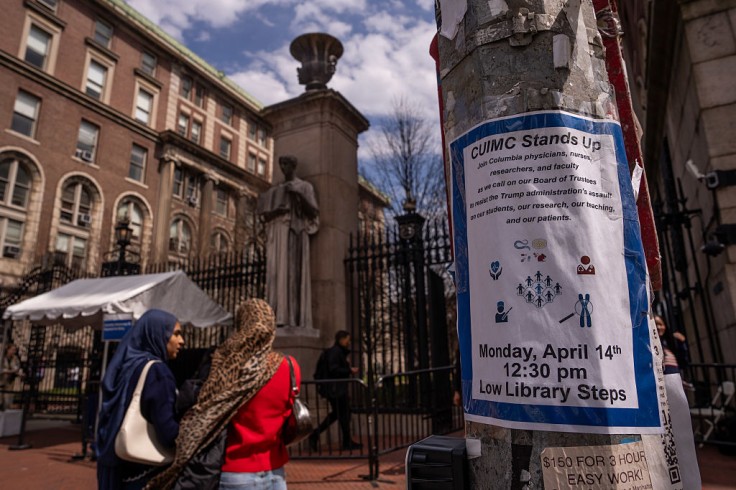Trump's Executive Order Targets College Accreditors, Sparks Debate Over Higher Education Reform
By
Columbia University is bracing for renewed unrest as a group of protesters plans to erect tent encampments on its campuses this week to protest the ongoing war in Gaza, according to sources familiar with the planning. The move, shrouded in secrecy and organized by masked participants using code names, comes just over a year after similar demonstrations drew international attention and prompted harsh responses from both the university and the Trump administration. With the university vowing to dismantle any encampments immediately, students face potential sanctions, arrests, and a chilling effect on campus activism.
The plans were discussed during a clandestine meeting in Brooklyn on Tuesday night, where participants wore masks and identified themselves only by their Signal handles, such as "Squirtle" and "butterfly," to maintain anonymity. "Individuals who refuse to disperse will be identified and sanctions, including potential removal from campus and possible arrest, may be applied," Columbia's public safety division stated, signaling a zero-tolerance approach to the planned protests. The university plans to remove tents, restrict access to affected areas, and possibly limit campus entry to prevent a repeat of last year's events.
Last spring, Columbia students erected about 50 tents on a university lawn, sparking a wave of similar protests nationwide and drawing scrutiny from the Trump administration, which accused the university of failing to address antisemitism on campus. Those demonstrations led to significant concessions from Columbia, including a mask ban, new security measures, and the appointment of a senior vice provost to oversee its Department of Middle East, South Asian, and African Studies. The administration also faced the loss of $400 million in federal funding, which it is now negotiating to restore by complying with federal demands.
The planned encampments follow a turbulent period for Columbia's pro-Palestinian activists. Mahmoud Khalil, a former graduate student and prominent protest leader, was arrested by Immigration and Customs Enforcement (ICE) on March 8, 2025, and faces deportation, prompting nationwide outrage and protests. "It is incumbent upon each of you to reclaim the University and join the student movement to carry forward the work of the past year," Khalil wrote in an op-ed, urging students to continue their activism despite the risks. Other students, like Yunseo Chung, have also faced deportation threats, while some have been disciplined or suspended for their involvement in protests.
The Trump administration's crackdown has intensified fears among students, particularly international students, who worry about visa revocations and arrests. Elora Mukherjee, director of the Immigrants' Rights Clinic at Columbia Law School, described the targeting of students as an effort to send a "clear message about who is unwelcome in the United States," noting that most affected students are from nonwhite backgrounds. Columbia's interim president, Dr. Katrina Armstrong, stepped down last month amid the turmoil, and the university's recent compliance with federal demands has left some students feeling betrayed.
Posts on X reflect the polarized sentiment, with some users like@cethomas19 warning of consequences for protesters—"HERE WE GO AGAIN! FAFO!"—while others, like@pjmooney, blame the Trump administration for "creating more and more chaos" [,]. The planned protests also draw inspiration from last year's encampments, documented in the film The Encampments, which portrays the demonstrations as largely peaceful and inclusive, with Jewish students holding Passover seders alongside pro-Palestinian activists.
🚨HERE WE GO AGAIN! FAFO!
— Christy Thomas 🇺🇲 (@cethomas19) April 24, 2025
Columbia University students plan to build tent encampments this week
REMEMBER LAST YEARS COLUMBIA UNIVERSITY PRO-PALESTINE PROTEST
https://t.co/kGyQeZqbaO
Columbia University students plan to build tent encampments this week, sources say - Trump's outrageous behavior is creating more and more chaos. . https://t.co/ovzezEGZT5
— Paul Mooney 慕亦仁 (@pjmooney) April 24, 2025
For students like those quoted anonymously in campus forums, the stakes are high. "I'm scared to protest now, but staying silent feels like giving up," one student said. Faculty members, too, are concerned about the erosion of free speech, with some citing Columbia's history of progressive activism as a reason to resist federal overreach. As the university prepares to clamp down on the encampments, the clash between student activism and administrative control promises to reignite tensions on a campus already on edge.
© 2025 University Herald, All rights reserved. Do not reproduce without permission.








